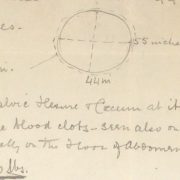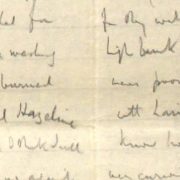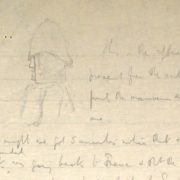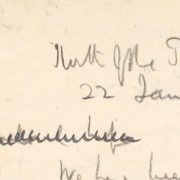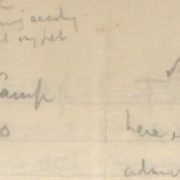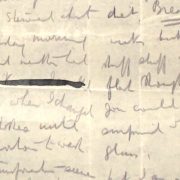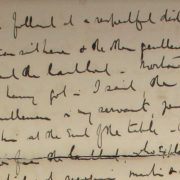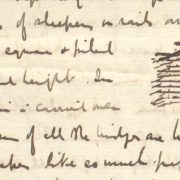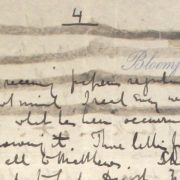[FS/2/2/4/2/7]
Camp name unknown N of the Tugela & clod close to Acton Holmes.
(Ventner’s Sprint Camp River Tugela)
Just found out the name of camp 24.1.00
[Words Redacted] of 19 January 1900
[Line Redacted]
*[1]
I fear you may have some difficulty in reading certain parts of this letter
[Salutation Redacted]
We left the camp of Spearman Hill when on the day I last wrote to you, at night & made a night march to some point about 6 miles due East. It was not quite dark but the road in places was awful impossible to describe up & down hill through stormy weather how the transport got over is a miracle. not[sic] a word was spoken nor a pipe allowed as we were making a flank march to cross the Tugela above the position occupied by the enemy[,] about 11 pm we halted & down came the rain, fortunately it did not last long, but I had my waterproof & well gummed boots on, for hours we stood on the side of the road in a field of long grass which was soaking wet & at daylight we expected to cross the river by pontoon, but the operation was delayed all day the enemy was in occupation of the ford & had to be driven out ours was a very strong position & about 2pm we advanced advanced to the river
We had nothing but biscuit & broth all day & water from the nearest ditch, we waded in water like soup & drank the same[.]
The delay in crossing was considerable, miles of transport, during the pontoon operation a man was killed by a long shot through the neck, the cavalry forded a river & here a chapter of accidents occurred, some men were carried away Tremayne our Adjutant jumped in & tried to save him & Wise my tent fellow jumped into to save another, he got his man out but Tremayne’s man was drowned & Tremayne was only got out with difficulty though both expert swimmers. Tremayne was unconscious but has recovered the river is most dangerous & awful currents.
I crossed by the pontoon but I thought my little horse was lost, he nearly fell over through fright here also two mules we lost by drowning. We bivouacked again that night & of course it again rained though not heavily. Though our kits were kept down to 20lbs I carried on my mule all I wanted my [illeg], valise & w’proof sheet. I was thankful a saddle for my head, or a tin of bully beef or waterbottle[sic], all equally soft to lie on did not keep one awake, others were so cold at 3am they could not sleep & had to walk about. Breakfast was light but I have since found the way of tackling biscuit which renders it palatable & quite easy to bite.
[[2]] Before leaving this camp I got a wire to say Crawford was dead, he died at Maritzburg the previous night — Poor fellow I am very sorry I only saw him a fortnight before & he then said he was better than he had been for years. His poor wife & children have my heartfelt sorrow[.]
Gladstone being close with the Royals I went over & showed him the wire. He is the next Senior, until we get to Ladysmith & relieve Matthews. This day being later the 18th we moved off to the left towards the Orange Free State to cut off the retreating Boers should the attack which is being made at three different points on the river succeed. The fight we expected would take place on the 18th but it did not we had so much transport to get over, we continued advancing slowly to our left to get round the Boers & our advance party came in with some of them killing & wounding 30 including a Free State General killed & taking 20 prisoners. We lost a few men (not of the 13th) but on the whole the day though slow was useful. You cannot imagine the country we crossed streams with rapid current (another horse drowned) hills at an angle of 45° up which every waggon[sic] had to be drawn by hand & places which one would have said it was impossible for wheel transport to get over. We got to the camp at dusk the 13 being left behind on a Kopje[2] a mile or so to the rear.
Got an excellent dinner of bully biscuit & marmalade & again bivouacked there was a very heavy dew soaked everything but my waterproof saved me & I got up from the grass quite dry. All this time I have not shaved & my face is so sore I can only sponge it lightly[.] You might recognise me but I doubt it with nearly a weeks[sic] growth on my face. I ought to have said I left Morton behind & my other servant at the old camp opposite Potgieters drift but I have the [2 words illeg.]. I left them behind as they have to march & I knew we were going to Ladysmith by a circuitous route. Close to this camp is a kraal[3] [1 line redacted], there I found a woman stark naked sitting on the ground, she was about 16 years of age & took no notice of us [2 lines redacted] she & a decrepit old woman were the sole occupants[.] The young woman I think was an imbecile
[[3]] I got Jarvis to take 2 photos of her [1 line redacted] & hope to show it to you some day. She was an absolute animal. Before we left Spearmans Hill I got Jarvis also to photo Morton asleep his usual occupation. To day[sic] we expect a fight if the other attacks along the river can be pushed home. Imagine the extent of our operation when I tell you our front is not less than 10 miles in length & probably much more. Firing has been going on more or less all night & again this morning but not in our vicinity. This brings me up to date[,] more later as events occur.
24 Jan. What events have occurred since I last wrote we moved on the evening of the day I made my last entry to a place called Acton Holmes not far from here. The place is one mass of rocks & boulders & these we had to move on one side before we could find a place for the horses. As for ourselves we dug out & removed all the rocks & stones we could but many went so far into the ground that their removal was impossible. We passed a pleasant night & as I looked up at the stars over my head I wondered whether that the same could be seen from the Croft.[4] It was the last sleep many had for in the morning the battle began, the first indication we had of it was a shell which exploded in a kraal to our front we had no conception where it came from probably fired 5 miles away & with smokeless powder. One of the most terrifying features of modern warfare is the destruction wrought by a foe who cannot be located, he may be near or far, but he continues to pump in his iron & lead while escape from it is impossible in asmuch[sic] as one has no idea which direction is a safe one
Well this the first day of the battle lasted from about 7 am to 7.30 pm, & more or less throughout the night. We did not again come under fire until about 11am when a little circumstance of intent to me occurred. The Regt.was hidden in a nullah[5] n ot only out of sight but to keep it away from an infernal gun the position of which we could not locate. I was letting my horse graze with the bit out of his mouth when I saw a Maxim gun hurrying up to the front, leaving my bit hanging on my the
[[4]] hilt of my sword I slipped the snaffle into his mouth girdled up & cantered forward about 100 yards or so. I halted put up my glasses when I suddenly heard the hissing of a shell it came nearer & nearer & just as I thought it would hit me on the head I ducked down I heard it strike the ground & explode & looking behind we saw a column of dust 20ft in height about 100 yards behind me & exactly where I was grazing my horse only a minute before — I wish you could have seen yours truly scuttle back, I had no time to put my glass back in their place as shell after shell was falling, then I remembered I had hung my bit on my sword & that the reins were probably dragging along the ground & might bring me down in addition the ground was stony rocky & very difficult to get over so that my position for a few minutes was not comfortable. Of course bear in mind they were not firing at me but were only anxious to locate the position of the cavalry.
Later in the day they dropped two shells into a squadron of the Royals as they crossed a field close to this place I was watching the advance of the squadron from a hill some distance off at the moment for they were well on our left. You cannot imagine the startling effect of two shells dropped one after the other into a mass, they scattered like chaff before the wind is in all directions men without horses, horses without men, some the right others to the left & strange to say as we subsequently learned without the loss of a horse or a man. To recount all the operations of this day would be impossible I could only see what was occurring over about 4 miles of country[.] Our fire was terrific & we set fire to more than one of their positions. I ought to have explained before that their positions were well chosen the tops of high hills while nothing but the valleys below were left for us. The irregular Cavalry took one hill a very steep one I could not believe my eyes as I saw the men some with & some without horses crawling up the side of this sugar loaf hill[6]
[FS/2/2/4/2/7] (2)
[[1]] now known as Childe’s Hill from the name of the man who led the assault & was killed, of him later. The game went on all day & night found us tired & sleeping close to the base of Childe’s Hill having previously to get all our animals & waggons through a river. Fortunately I had a good dinner that night even though the night of a battle & slept in a ploughed field, at any rate if not so clean it is softer than the velt[sic]. I must have been tired as I fell asleep soon & [3 lines redacted].
On the following day (21 Jan) we moved early from the ploughed field & went back over the drift & river to our old camp about 1 mile further back as we were exposed to the fire of a long range gun, we got back after a short time & had settled to breakfast when suddenly there was a hissing sound of an approaching shell & one dropped not far from where we were sitting, a second came still nearer & it was evident our position was known, we moved a little further forward under cover of a hill & there we have been for two days the battle going on day by day with monotonous regularity. There are 12 guns on our right which pump in shrapnel all day. Hitherto both sides have observed Sunday as a day of rest, but last Sunday we fought all day & it is now Tuesday & we have not yet got their position. It was confidently believed that we would get to Ladysmith by Wednesday (to morrow[sic]) but that is impossible.
Major ChildeLate R H Guards came out to one of the Regts of irreglar cavalry or Mtd infantry. He was originally Childe-Pemberton but dropped the P. He led his men up the steep hill in gallant style & soon after they got to the top a shell hit him on the head & killed him. Now it is a curious fact that the night before at dinner Childe said he knew he would be killed the next day, & though the fellows chaffed him he persisted in his statement & dictated his own Epitaph which he directed to be placed on his grave. It was as follows: —
[[2]] “Is it well with the Child? It is well!” Now this is a most extraordinary coincidence & worth telling to people. The man was killed as he said he would be, he was buried early the next morning & by evening a simple wooden cross with his rank name & regt, date of death, & the above Epitaph upon it was erected No parson buried him, he was buried by a brother officer nothing but his belts were taken off even his spurs were buried with him & I knew him by sight, he leaves a wife but no family. There is no telegraph officer here so that no one can send her a wire.
There he is in his grave two days (he is buried 100 yards from where I am writing this) & his friends ignorant of the fact but perhaps it is just as well so. Great sympathy is felt for him, it is [3 lines redacted].
He was buried on the 2nd day of the fight & since that we have not had very active employment the Artillery hammering is incessant but it does not interfere with our movements. Yesterday I went & had a bath in the river & washed my clothes, I only have those I stand up in & they have not been off since last Monday week viz 9 days today boots the same. So I determined to wash everything Jarvis & I proceeded to the River & we did it well I washed shirt, drawers[,] socks, cholera belt[7]
It took 3 hours for the things to dry during which time we sat on the rocks or in the water shaved & otherwise wasted time while the clothes dried. It would have been a sight for a photograph[,] I in the water up to my neck with a cascade playing on me my helmet on my head & smoking my pipe, Jarvis sitting on the rocks shaving, while a short distance behind was a battery of howitzers[8] pumping in 50lbs Lyddite shells into an enemy 2 miles off a curious scene for a quite[sic] South African river.
I ought to explain before I go further that I have shaved. I know this will be a great relief to you & it was to me, I now protect my face with that valuable red silk pock’ h’chief[sic] & so prevent it from getting burned though in the effort I am more like a Guy Fawkes than a reasonable being. If only my little son could see me, he would laugh for a week[.]
[[3]] *[9] this is the appearance I present from the side. I find the manoeuvre an excellent one.
Last night we got 5 minutes notice that a convoy of sick & wounded were going back to Frere & that the Medical officers would take back letters for England. I tore out a page from a book & wrote you a few hasty lines, this letter had been started but was very incomplete so I thought it best to send you a short note to show you I was fit & well rather than send you an incomplete letter — I was sorry for the haste in which it was written, but the man was standing waiting for it, I sent a scrawl & without a stamp. I do not know when this letter will go, but I will keep it addressed & ready to close at a moment’s notice.
The place I sleep in would greatly amuse our two dear mites, there is a pack saddle & a Field pannier, the one forms the head of my bed the other the side. *[10] Across the pack saddle & pannier I stretch my waterproof & this keeps off the rain & wind from my face & the heavy dews. Close to my head is my revolver waterbottle[sic] & haversack. I sleep in clothes, boots woollen waistcoat (if very cold sweater also) & Ulster[11]. So you see I am well protected at night. The ground of course is hard & one rises in the morning very stiff & sore from contact with such an unyielding surface.
Of course I have received no letter from you for last week, it is said that our mail got as far as the Tugela & was sent back, if so it is very rough on us. I hope to receive from you the newspapers containing a full account of all our movements, for as you truly say though on the spot we know the least excepting of things occurring in our immediate vicinity.
This battle will be the most remarkable in History, it is now in its fourth consecutive day, & though we are pushing on slowly still progress is not rapid. The people in Ladysmith are we hear suffering great privation eggs are 30/- a dozen. Even here things are at famine prices which are scarce. Soldiers are offering 5/- for a packet of 10 cigarettes!! I will soon be out of tobacco so must nurse what little I have. — I shall certainly be glad when Ladysmith is relieved.
[[4]] *[12] I hear Crawford died from dysentery. Poor fellow. Will it improve my prospects!!!
24 Jan. Last night or rather at 3 am to day[sic] we made a night attack on the enemy. The artillery pounded away for an hour & then the infantry went in. In the still night air the streams of lead as the infantry fired volleys was exactly like the escape of steam from a steam engine[.]
It was most curious one does not notice the sound during the day. A battle by night is a very weird sight. I am glad I did not lose it. The result of the night attack we do not yet know, though it is possibly available to the city clerk on his[?] way to London this morning, but the fact remains that this is the fifth day of the battle & we have got very little further ahead. Really the Boers are very serious antagonists. They have a gun which fires eight times in succession a one pound shell[,] each shell is dropped at a different range. The noise it makes is exactly like Pow Pow Pow & so on repeatedly for eight shots. Its[sic] a devilish contrivance & we cannot locate its position. Yesterday we lost in one regt alone 1 officer & 15 men & I think Pow Pow has some thing[sic] to say to it.
I hear this morning that letters are being sent in so to atone for the shabby note which was sent you a day or two ago I will send this off up to date. I trust to you keeping all these letters as they are my diary of the war.
Firing is still now going on against the hill we tackled last Saturday, so that I judge the night attack had not the fullest measure of success. [3 lines redacted].
Nearly a fortnight since I heard from you the letters are in the country but we cannot get them. Ten days since we started on this show & I have never been out of my clothes & boots except to bathe. You can imagine how we look [5 lines redacted].
[No Valediction]
(Please note that work on this transcript is ongoing. Users are advised to study the electronic images of this document where possible. http://rcvsvethistory.org/archive-collection/fs-working-papers/)
[1] Annotated by Smith with ‘Keep’
[2] South African Dialect, a small hill in a relatively flat area.
[3] Either a village of huts enclosed by a fence, or an enclosure for cattle or sheep
[4] Smith’s home – The Croft, Little Heath, Charlton, in South East London
[5] A watercourse, riverbed or ravine
[6] Comparing the hills to the Sugar Loaf, Monmouthshire which are mountains in South Wales
[7] a flat strip of flannel or knitted wool worn around the abdomen under a shirt as a preventive measure against cholera
[8] A short gun for firing shells on high trajectories at low velocities.
[9] Caricature by Smith of his self-fashioned technique to protect his face from sunburn
[10] Drawing by Smith of his sleeping arrangements.
[11] A long loose overcoat
[12] Later annotations added to the top of the page ’19th Jan Tugela’ and ‘January 00’

